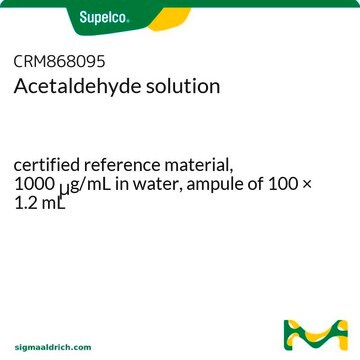W200387
Acetaldehído solution
40 wt. % in isopropanol
About This Item
Productos recomendados
biological source
synthetic
Quality Level
reg. compliance
FDA 21 CFR 117
FDA 21 CFR 182.60
form
liquid
concentration
35.00-45.00% (titration by hydroxylamine)
40 wt. % in isopropanol
mp
-123 °C
density
0.868 g/mL at 20 °C
application(s)
flavors and fragrances
documentation
see Safety & Documentation for available documents
food allergen
no known allergens
organoleptic
pungent; ethereal; fruity
storage temp.
2-8°C
SMILES string
[H]C(C)=O
InChI
1S/C2H4O/c1-2-3/h2H,1H3
InChI key
IKHGUXGNUITLKF-UHFFFAOYSA-N
¿Está buscando productos similares? Visita Guía de comparación de productos
Disclaimer
signalword
Danger
Hazard Classifications
Carc. 1B - Eye Irrit. 2 - Flam. Liq. 1 - Muta. 2 - STOT SE 3
target_organs
Central nervous system, Respiratory system
Storage Class
3 - Flammable liquids
wgk_germany
WGK 3
flash_point_f
-34.6 °F
flash_point_c
-37 °C
ppe
Eyeshields, Faceshields, Gloves
Certificados de análisis (COA)
Busque Certificados de análisis (COA) introduciendo el número de lote del producto. Los números de lote se encuentran en la etiqueta del producto después de las palabras «Lot» o «Batch»
¿Ya tiene este producto?
Encuentre la documentación para los productos que ha comprado recientemente en la Biblioteca de documentos.
Los clientes también vieron
Nuestro equipo de científicos tiene experiencia en todas las áreas de investigación: Ciencias de la vida, Ciencia de los materiales, Síntesis química, Cromatografía, Analítica y muchas otras.
Póngase en contacto con el Servicio técnico






